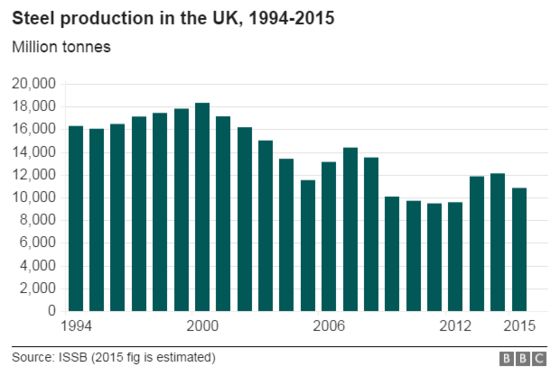REMEMBER WHERE IT STARTED
"THE WEALTH OF NATIONS"
“If policies to secure the industrial future of Europe’s basic materials industry aren’t quickly introduced, many thousand more EU-jobs are under severe threat,” said Wolfgang Eder, chief executive officer of Voestalpine AG, a producer of the metal in Austria, and chairman of the World Steel Association. “At the same time we are in danger of throwing away our last ace –- the technological leadership we still have in some of these areas –- because of the continuous lack of money for innovation and technical upgrading.”
BLOOMBERG

Can One of the Top Economies Live Without Making Steel?

- Tata's Plant Sale Reflects U.K.’s Fading Steel Industry
- U.K. may lose final furnaces after centuries of steelmaking
- `Steel is a fundamental part of any industrial nation'
- The U.K. once made nearly half the world’s steel. Soon it may produce almost none.
 Tata Steel Ltd. plans to sell its U.K. business which include the country’s last blast furnace sites in Scunthorpe and Port Talbot. Used to turn iron ore into steel, these giant plants are the focus of the entire industry. They are also the assets that may prove the most difficult to unload, according to at least one potential buyer.
Tata Steel Ltd. plans to sell its U.K. business which include the country’s last blast furnace sites in Scunthorpe and Port Talbot. Used to turn iron ore into steel, these giant plants are the focus of the entire industry. They are also the assets that may prove the most difficult to unload, according to at least one potential buyer.
Should Tata’s plants follow Redcar, shut last year, the U.K. would become the first member of the Group of Seven leading economies to operate no blast furnaces. It’s a far cry from its Victorian metal-bashing heyday when Britain produced about 40 percent of global supply. But beyond the immediate impact on employment, does it matter? Does a major industrial economy need to produce steel, a material vital to industries from construction to car making?
 “They’re probably done for,” said Keith Burnett, vice-chancellor at the University of Sheffield, a place that won the moniker Steel City before the industry’s decline. “But if we accept that, it’s a really big step and the long-term consequences are to lose the capabilities to make our own railways, make our own weapon systems, make our own nuclear reactors.”
“They’re probably done for,” said Keith Burnett, vice-chancellor at the University of Sheffield, a place that won the moniker Steel City before the industry’s decline. “But if we accept that, it’s a really big step and the long-term consequences are to lose the capabilities to make our own railways, make our own weapon systems, make our own nuclear reactors.”
World Laggard
The U.K. was already the industrial world’s laggard when it comes to steel, producing just 12.1 million tons in 2014, less than a third of what Germany makes each year and just over a tenth of Japan’s 110.7 million-ton output. China is the world’s biggest producer making about half the world’s 1.67 billion tons of steel.
British steel making has been in relative decline for more than a century, eclipsed by the by the U.S. by the start of World War I and later overtaken by Germany. In the 1970s and 1980s, inefficient and outdated plants led to production falling 64 percent to less than 10 million metric tons, and the country’s output slipped below France, Italy and Belgium.

